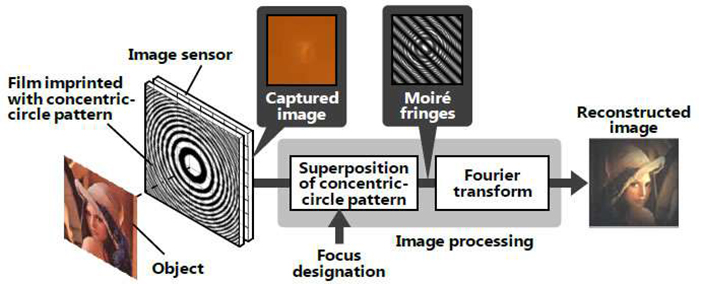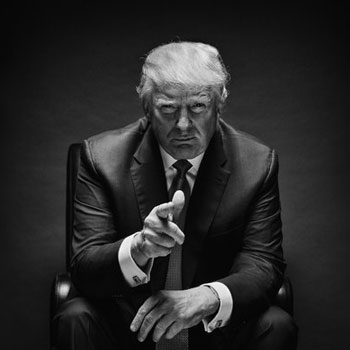Hitachi announced announced a camera technology that can capture video images without using a lens and adjust focus after image capture. It does this by using a film imprinted with a concentric-circle pattern instead of a lens. And do we really need Snapchat’s camera sunglasses? Plus U.S. president-elect Donald Trump promises to make America better than ever. What has photography got to do with it?
Hitachi’s new technology makes it possible to make the camera lighter and thinner since a lens is unnecessary. It also allows the camera to be more freely mounted in devices, such as mobile devices and robots at arbitrary positions, without imposing design restraints.

The technology will will mainly be of industrial use. Hitachi aims to utilize it in a broad range of applications, such as work support, automated driving and human-behavior analysis with mobile devices, vehicles and robots. Downside? Processing of images incurs a heavy computational load.
Snap, formerly called Snapchat, bets on a camera-first future. Et voilà Snap’s Spectacles, a pair of glasses that lets you “share with people, and get to experience what they’ve experienced from their perspective.”
Do we really want that? Snaps bets: yes we do. It’s the future, reports Wired:
Long-term, the idea that a camera isn’t just for making scrapbooks is crucial to Snap’s future. Everyone’s future, really: camera lenses seem to be poised to reinvent computing the way the keyboard and mouse once did, or the touchscreen after that. Computers are rapidly becoming smart enough to recognize what’s actually in a photo or video — the type of bird, the specific spot at Yellowstone, the identity of your subject — and there’s almost no telling what that might do. “There’ll be all sorts of stuff that doesn’t look like an image recognition problem,” says venture capitalist Benedict Evans, “but is an image recognition problem.”
Never mind privacy, ’nuff said. You can order Spectacles from Amazon.
TIME magazine gets into photography and politics: What Trump’s Win Says About the State of Photography in America. Great piece. Read it. This is not whether you like Trump or not. This is about anyone’s duty.
 The author suggests that we have failed to get the stories that matter to the people that need to hear them. I rather think the contrary. We have failed to care about the stories that matter, and failed to report on the stories that matter because of those stupid fears to not being “politically correct.”
The author suggests that we have failed to get the stories that matter to the people that need to hear them. I rather think the contrary. We have failed to care about the stories that matter, and failed to report on the stories that matter because of those stupid fears to not being “politically correct.”
Forget about political correctness. It’s a big disease of our time. Say what’s not right, stand up for it, and if it’s not mainstream.
TIME’s authors nevertheless raise important questions. Images seemed less significant in this election cycle. Social media is what people reacted to. Tweets mattered, not pictures. Almost every day would begin with something about or by Donald Trump, which would then set the agenda. It was as if there was less time to absorb imagery because there were so many distractions.
The authors’ plea to journalists and visual storytellers:
Go out and use your voices to tell the stories of these communities. They need your help. Our democracy needs your help. Donald Trump ran on a platform of being a hate-monger, a misogynist and a race-baiter. He has conned America, and our ire — or more appropriately our critical minds — should be directed at him, not at those who voted for him.
Better yet, channel your energy into finding common ground so we can start to agree on things and engender more empathy and understanding towards each other. While we as journalists can’t do this alone, we can contribute greatly to healing our divided society.
It’s time to abandon the tropes that have been so damaging to our society and get to work telling stories that inform and help people make the best decisions they can possibly make. It is incumbent on us to understand each other for who we really are, what we care about, what are our real problems, hopes and needs.


